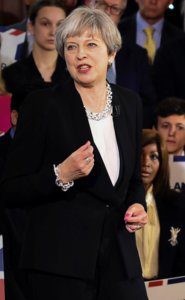All the three main parties in the UK General Election – Labour, the Conservatives (Tories) and the Liberal Democrats (Lib Dems) – have made manifesto promises to support science, innovation and R&D, and are thus thought to be in favour of the UK’s small but successful space industry. But only the Lib Dems directly mention space in their manifesto. So it is hurrah for them!
Interestingly, while the two major parties are now in favour of “Brexit” (unlike the Lib Dems) there is no commitment in the Conservative or Labour manifestos to make good any EU funding withdrawals from scientific, infrastructure and technological projects, which will be concerning to some UK space enterprises.
Of course, space remains a sideshow as there are not many votes in space research. The major battleground of the campaign so far has been how the elderly are treated and paid for.
Initially, the Conservatives, led by Prime Minister Theresa May, had an almost unassailable lead of 20 percentage points over Labour. However, this has been cut by Labour’s popular (but possibly unaffordable) manifesto promises, mainly drafted by party leader Jeremy Corbyn. These include a commitment to end University tuition fees and a plan to renationalise the railways and utilities. Mrs May’s team also suffered a backlash against an unpopular proposal to make all but £100,000 of a person’s estate forfeit to social care charges. The Tories have also promised to reduce the “triple lock” on pension increases to a double lock and to means-test winter fuel payments.

Conservative leader Theresa May is popular but her manifesto is less so. Courtesy: The Conservative Party
On defence, both the Conservatives and Labour have signed up to the NATO nation minimum of 2 per cent of GDP for defence spending, although, in reality, much more may be needed given that expensive equipment such as the UK Skynet communications satellite fleet needs to be replaced.
Both main parties remain officially committed to building four new Trident nuclear-armed missile carrying submarines, even though the anti-nuclear Labour leader Jeremy Corbyn is known to be opposed. However, if elected as Prime Minister, Corbyn would have the executive authority to effectively “remove the Trident firing pin”. That is, he could issue a standing order to his current submarine commanders to never launch the Trident missiles under any circumstances. On the subject of nuclear deterrence or lack thereof, the Lib Dems have promised to build only three replacement boats instead of four (submarines are called boats and not ships by the way), ending a continuous at-sea deterrence capability.
The Scottish Nationalists, Plaid Cymru and Greens, broadly have similar policies to the Labour Party, except for having a non-nuclear stance. For differences, click on the name of each to get to their respective websites.
Post Script: Toddy’s Tip is that Labour will close the gap by enough to add to its current total of 229 parliamentary seats, albeit not enough to overturn a Tory majority. Your correspondent has thus made a small bet at odds of 33-1 that Labour will get between 250 and 299 seats in the next parliament. (BTW, your correspondent’s political tips have come good in the recent past with both Brexit and Trump’s electoral victory being predicted and bet upon by him – although he did get the 2015 General Election a bit wrong).
Update and comment by David Todd on 22 May 2017: Since writing this, the Conservative poll lead has fallen into single figures as have the above odds (Labour is actually ahead in Wales). Sensing the electoral danger from the “Dementia Tax” backlash, Theresa May has now made a partial U-turn (is that an L-turn?) on this unpopular social care policy. Now a limit will be applied to the size of care payments. However, until the size of the cap is set, voter concern will remain.
Update in October 2017: A belated note to brag that your correspondent’s prediction came true and the bet was won. Labour are now favourites to win the next election. Not surprisingly given this and the previous Conservative administration’s record: UK health services in financial crisis resulting in operations being cut and the unavailability of GP doctors, defence budgets being slashed – especially the Royal Navy, tuition fees becoming totally unaffordable for students, wages not keeping up with inflation, botched welfare reforms bordering on cruelty (the room tax, the universal credit etc), and of course, the ever present housing crisis. Oh yes…and Tory divisions over Brexit. Not really a good record to defend!
Nevertheless, while Corbyn and his allies wrote a good previous manifesto stimulating a genuine change in the political wind, he himself remains an electoral liability. Many genuinely fear his dangerously naïve pacifism and loath his past and present support for left wing dictators and terrorists. It will definitely not be a landslide whichever party wins next time.







